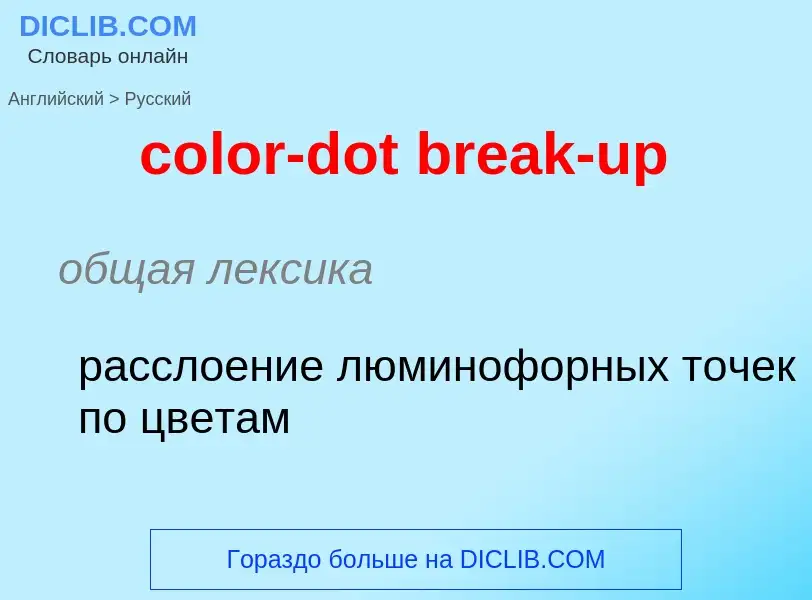Перевод и анализ слов искусственным интеллектом ChatGPT
На этой странице Вы можете получить подробный анализ слова или словосочетания, произведенный с помощью лучшей на сегодняшний день технологии искусственного интеллекта:
- как употребляется слово
- частота употребления
- используется оно чаще в устной или письменной речи
- варианты перевода слова
- примеры употребления (несколько фраз с переводом)
- этимология
color-dot break-up - перевод на Английский
color="gray">общая лексика
расслоение люминофорных точек по цветам
color="gray">общая лексика
открывать силой
color="gray">['kɔfibreik]
color="gray">общая лексика
короткий перерыв (color="gray">в работе, чтобы выпить кофе)
color="gray">существительное
color="gray">общая лексика
короткий перерыв color="gray">(в работе, чтобы выпить кофе)
color="gray">['breikʌp]
color="gray">общая лексика
распад
разрушение
color="gray">Смотрите также
color="gray">существительное
color="gray">общая лексика
развал
разрушение
распад
разложение
разделение
прекращение (color="gray">занятий в школе и т. п.)
роспуск парламента
разрыв (color="gray">между друзьями, супругами)
разруха
закрытие школы color="gray">(на каникулы)
color="gray">строительное дело
обеденный перерыв color="gray">(для рабочих)
Определение
Википедия
The Informbiro period was an era of Yugoslavia's history following the Tito–Stalin split in mid-1948 that lasted until the country's partial rapprochement with the Soviet Union in 1955 with the signing of the Belgrade declaration. After World War II in Yugoslavia, Yugoslavia's new leadership under Josip Broz Tito pursued a foreign policy that did not align with the interests of the Eastern Bloc. Eventually, this led to public conflict, but the Yugoslav leadership decided not to acquiesce to Soviet demands, despite significant external and internal pressures. The period saw the persecution of the political opposition in Yugoslavia, resulting in thousands being imprisoned, exiled, or sent to forced labour. 100 Yugoslav citizens were seriously wounded or killed between 1948 and 1953 while some sources claim 400 victims during the existence of Goli otok prison camp. The purges included a significant number of members of Yugoslavia's security apparatus and its military.
This break with the Eastern Bloc caused significant economic difficulties for Yugoslavia as the country relied on trade with the USSR and Soviet allies. Economic pressures within the country led to reforms that would ultimately result in the introduction of socialist self-management and increased decentralisation of the country through constitutional amendments formalising the reforms.
The United States saw the rift between the Eastern Bloc and Yugoslavia as an opportunity during the Cold War to fragment the Eastern Bloc further and consequently provided economic and military aid, loans, and diplomatic support to the country. The new foreign policy circumstances led Tito to end Yugoslav support of Communist forces in the Greek Civil War and concluded the Balkan Pact, an agreement of cooperation and defence with Greece and Turkey.
The period had an impact on Yugoslavia's contemporary art and popular culture, as artists were encouraged to seek inspiration in the wartime struggle of the Yugoslav Partisans and the construction of new infrastructure. Decades later, a great many literary works and films covered the era's events.
The descriptor "Informbiro period" arose from the Communist Information Bureau, an organisation initiated by Stalin that had aimed to reduce divergence among communist governments.

![Yugoslav State Security Administration]]. Yugoslav State Security Administration]].](https://commons.wikimedia.org/wiki/Special:FilePath/Aleksandar Ranković (1).jpg?width=200)
![[[Arso Jovanović]] headed an unsuccessful [[coup d'état]] and was subsequently killed while fleeing to Romania. [[Arso Jovanović]] headed an unsuccessful [[coup d'état]] and was subsequently killed while fleeing to Romania.](https://commons.wikimedia.org/wiki/Special:FilePath/Arso Jovanović.jpg?width=200)
![Yugoslavia saw large-scale labour-intensive infrastructure works, such as construction of [[New Belgrade]] where this photo was taken. Yugoslavia saw large-scale labour-intensive infrastructure works, such as construction of [[New Belgrade]] where this photo was taken.](https://commons.wikimedia.org/wiki/Special:FilePath/Building of New Belgrade (Yugoslavia 1948-1950).jpg?width=200)
![[[Goli Otok]] prison camp was built to hold people convicted of supporting Stalin after the split from the USSR. [[Goli Otok]] prison camp was built to hold people convicted of supporting Stalin after the split from the USSR.](https://commons.wikimedia.org/wiki/Special:FilePath/Goli otok zatvor.jpg?width=200)
![Construction of the [[Jablanica Dam]] took place during the period following the Tito–Stalin split as one of major infrastructural works in Yugoslavia. Construction of the [[Jablanica Dam]] took place during the period following the Tito–Stalin split as one of major infrastructural works in Yugoslavia.](https://commons.wikimedia.org/wiki/Special:FilePath/Jablaničko jezero 1.jpg?width=200)
![[[Predrag Matvejević]] coined the term "[[Goli Otok]] literature" to refer to works dealing with the period in the aftermath of the Yugoslav–Soviet rift. [[Predrag Matvejević]] coined the term "[[Goli Otok]] literature" to refer to works dealing with the period in the aftermath of the Yugoslav–Soviet rift.](https://commons.wikimedia.org/wiki/Special:FilePath/Predrag Matvejević on Subversive Festival.jpg?width=200)

![sixth congress]] held in Zagreb in 1952. sixth congress]] held in Zagreb in 1952.](https://commons.wikimedia.org/wiki/Special:FilePath/VI Kongres KPJ, Zagreb 1952.jpg?width=200)
![[[Smith & Wesson Model 1]] Third Issue open [[Smith & Wesson Model 1]] Third Issue open](https://commons.wikimedia.org/wiki/Special:FilePath/Mod1open.jpg?width=200)



![[[Seattle]] city employees taking a coffee break in the 1960s. [[Seattle]] city employees taking a coffee break in the 1960s.](https://commons.wikimedia.org/wiki/Special:FilePath/City Light employees on coffee break, 1960s.jpg?width=200)
.jpg?width=200)

